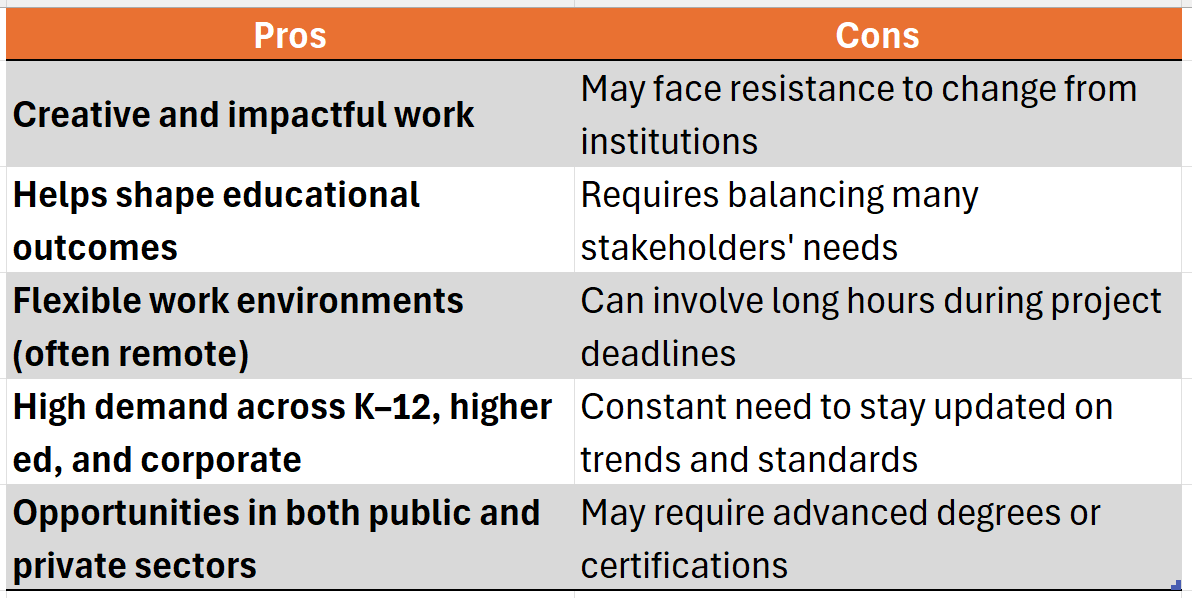
When considering a career in curriculum designer jobs, understanding the essential skills needed is crucial. These skills not only help you create effective educational programs but also ensure that learners receive the best possible experience. Let’s explore what you need to succeed in this exciting field!
Key Skills for Curriculum Designers
- Creativity: Designing engaging and innovative curricula requires a creative mindset. You’ll need to think outside the box to develop lessons that capture students’ interest.
- Knowledge of Differentiated Education: Understanding how to tailor lessons for diverse learning styles is vital. This ensures that all students, regardless of their abilities, can thrive in the classroom.
- Communication Skills: As a curriculum designer, you’ll collaborate with teachers and administrators. Clear communication helps convey your ideas effectively and fosters teamwork.
Educational Background
Having an instructional design master’s online can give you a significant advantage. This advanced degree equips you with the latest strategies and tools in curriculum development, making you a valuable asset in any educational setting. Plus, it shows your commitment to the field!
Unlock your potential with online degrees—Learn more!
Why Creativity is Key in Curriculum Design Roles

When exploring what skills are needed for curriculum designer jobs, creativity stands out as a vital ingredient. Curriculum designers are tasked with crafting engaging and effective learning experiences. This requires not just knowledge, but also the ability to think outside the box and tailor lessons to meet diverse student needs.
Understanding Differentiated Education
Creativity helps curriculum designers implement differentiated education. This means they must create lessons that cater to various learning styles. By using innovative methods, they can ensure that every student, regardless of their background, can grasp the material effectively.
The Role of Instructional Design Master’s Online
Pursuing an instructional design master’s online can enhance creativity. These programs teach aspiring designers how to blend technology with traditional teaching methods. This knowledge empowers them to develop unique curricula that inspire students and foster a love for learning.
Understanding Educational Standards: A Must for Curriculum Designers
Understanding the skills needed for curriculum designer jobs is crucial for anyone looking to make a mark in education. These professionals play a vital role in shaping how students learn, ensuring that lessons are engaging and effective. But what exactly do they need to succeed?
Knowledge of Educational Standards
A solid grasp of educational standards is essential. Curriculum designers must understand state and national guidelines to create relevant and compliant materials. This ensures that students receive a quality education that meets required benchmarks.
Differentiated Education Skills
Additionally, skills in differentiated education are key. Designers should be able to tailor lessons to meet diverse student needs, making learning accessible for everyone. This means knowing how to adapt content for various learning styles and abilities, which is vital in today’s classrooms.
Instructional Design Master’s Online
For those serious about this career, pursuing an instructional design master’s online can be a game-changer. It provides advanced knowledge and skills, making candidates more competitive in the job market. With the right education and skills, aspiring curriculum designers can truly make a difference.
How Technology Proficiency Enhances Curriculum Designer Jobs
In today’s fast-paced educational landscape, understanding the skills needed for curriculum designer jobs is crucial. As technology continues to evolve, so does the role of a curriculum designer. They must not only create engaging content but also ensure it meets the diverse needs of students through differentiated education.
Embracing Digital Tools
Being tech-savvy is essential for curriculum designers. They often use various software to develop interactive lessons. Familiarity with tools like Learning Management Systems (LMS) can streamline the design process and enhance student engagement.
Online Learning Trends
With the rise of online education, having an instructional design master’s online can be a game-changer. This advanced knowledge equips designers with the latest strategies to create effective digital curricula that resonate with learners of all backgrounds. In summary, technology proficiency is not just a bonus; it’s a necessity for curriculum designer jobs. By mastering digital tools and understanding online learning trends, designers can craft educational experiences that truly make a difference.
The Importance of Collaboration in Curriculum Development
In the world of education, the role of a curriculum designer is crucial. These professionals shape how students learn and grow. Understanding the skills needed for curriculum designer jobs is essential, especially in a time when differentiated education is key to meeting diverse student needs. Let’s explore the importance of collaboration in this process.
Teamwork Makes the Dream Work
Collaboration is at the heart of effective curriculum development. When curriculum designers work with teachers, administrators, and even students, they gather valuable insights. This teamwork helps create engaging lessons that cater to different learning styles, making education more accessible for everyone.
Skills to Foster Collaboration
To thrive in curriculum designer jobs, certain skills are vital:
- Communication: Clear dialogue helps convey ideas and gather feedback.
- Flexibility: Adapting to new ideas and changes is crucial.
- Empathy: Understanding the needs of students and teachers leads to better curriculum design.
By honing these skills, curriculum designers can create impactful educational experiences, often enhanced by pursuing an instructional design master’s online.
What Role Does Assessment Play in Curriculum Design?
When considering curriculum designer jobs, understanding the role of assessment is crucial. Assessments help educators gauge how well students are learning and whether the curriculum is effective. This feedback loop is essential for creating engaging and effective learning experiences.
Understanding Student Needs
- Assessments reveal what students know and where they struggle. This insight allows curriculum designers to create differentiated education strategies that cater to diverse learning styles.
Improving Curriculum Effectiveness
- Regular assessments help identify gaps in the curriculum. By analyzing results, designers can adjust lessons and materials, ensuring they meet educational standards and student needs.
Supporting Continuous Learning
- In an instructional design master’s online program, students learn how to integrate assessments into their designs. This skill is vital for adapting curricula to foster continuous improvement and student success.
Top Communication Skills Every Curriculum Designer Should Have
Communication is a vital skill for curriculum designer jobs, as these professionals create educational experiences that require clear idea conveyance and collaboration with various stakeholders. This ensures that the curriculum caters to all learners, including those who benefit from differentiated education.
- Active Listening: This skill is essential for understanding the needs of teachers and students, allowing designers to gather valuable feedback.
- Clear Writing: Curriculum materials should be easy to understand. Strong writing skills make instructions and content accessible to all.
- Presentation Skills: Designers frequently present ideas to educators and administrators, making effective communication in front of a group crucial.
Additionally, pursuing an instructional design master’s online can enhance communication abilities. This advanced education deepens knowledge and provides practical experience in creating engaging curricula. By developing these skills, aspiring curriculum designers can excel in their roles and significantly impact education.
Unlock your potential with online degrees—Learn more!
How to Stay Updated with Trends in Curriculum Design
Staying updated with trends in curriculum design is essential for those pursuing curriculum designer jobs. As education evolves, so do the strategies and tools for creating effective learning experiences. Understanding these trends can give you a competitive edge in the job market.
Embrace Lifelong Learning
Consider enrolling in an instructional design master’s online program to sharpen your skills. These programs cover the latest methodologies in curriculum design, preparing you to meet diverse learner needs.
Follow Industry Leaders
Stay informed by following thought leaders in differentiated education. Subscribe to blogs, podcasts, and webinars that focus on innovative teaching strategies to inspire fresh ideas for your projects.
Join Professional Networks
Joining professional organizations related to curriculum design can provide valuable resources and networking opportunities, allowing you to share insights and learn from experienced professionals.
Attend Workshops and Conferences
Participating in workshops and conferences showcases the latest tools and techniques in curriculum design, helping you enhance your skills.
Utilize Online Resources
Websites like Edutopia and the Association for Educational Communications and Technology offer articles on current trends, keeping you informed.
Experiment with New Tools
Don’t hesitate to try new educational technologies, as they can enhance your curriculum design and keep your teaching methods fresh.
The Value of Feedback: Improving Curriculum Through Evaluation
When exploring what skills are needed for curriculum designer jobs, one key aspect stands out: the value of feedback. Feedback is essential in refining educational materials and ensuring they meet the diverse needs of students. By embracing feedback, curriculum designers can create more effective and engaging learning experiences.
Understanding Differentiated Education
Differentiated education is all about tailoring learning to fit each student’s unique needs. Curriculum designers must be skilled in gathering and analyzing feedback to adjust their materials accordingly. This ensures that every student, regardless of their learning style, can thrive in the classroom.
Skills for Effective Evaluation
To excel in curriculum designer jobs, consider these vital skills:
- Analytical Thinking: Ability to assess feedback critically.
- Communication: Engaging with teachers and students to gather insights.
- Adaptability: Willingness to modify curriculum based on evaluation results.
Pursuing an instructional design master’s online can also enhance these skills, preparing you for a successful career in this rewarding field.
Discover How CollegeAndTuition.com Can Support Your Journey in Curriculum Design
When considering a career in curriculum designer jobs, understanding the essential skills needed is crucial. These skills not only help you create effective learning experiences but also ensure that students receive differentiated education tailored to their unique needs. Let’s explore what it takes to excel in this rewarding field.
Key Skills for Curriculum Designers
- Creativity: Crafting engaging lessons requires a creative mindset. Think outside the box to keep students interested!
- Analytical Thinking: You must analyze student needs and learning outcomes to design effective curricula.
- Communication: Clear communication with teachers and students is vital for successful implementation of your designs.
How CollegeAndTuition.com Can Help You
At CollegeAndTuition.com, we offer resources and an instructional design master’s online program that can enhance your skills. With our support, you can master the art of curriculum design and make a real difference in education. Join us and start your journey today!
Unlock your potential with online degrees—Learn more!
FAQs
1. What does a curriculum designer do?
A curriculum designer develops instructional materials, lesson plans, and educational programs that align with learning standards and goals.
2. What qualifications are needed for a curriculum designer job?
Most roles require a bachelor’s degree in education or a related field; many employers prefer a master’s degree and teaching experience.
3. Where do curriculum designers typically work?
They work in schools, universities, publishing companies, EdTech firms, nonprofits, and corporate training departments.
4. What skills are important for curriculum designers?
Key skills include instructional design, knowledge of learning theories, assessment development, content organization, and proficiency in digital tools.
5. Do curriculum designers need teaching experience?
Often yes—many employers prefer candidates with classroom experience to ensure practical understanding of instructional needs.
6. What software or tools do curriculum designers use?
Common tools include learning management systems (LMS), authoring tools like Articulate or Adobe Captivate, and curriculum mapping platforms.





